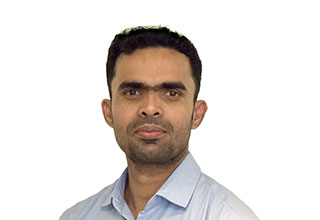
Dr. Anand Kumar
Assistant Professor
School of Management Studies.
Anand Kumar is working as an Assistant Professor in School of Management Studies, Nalanda University, Rajgir, India. He has designed and offers course on Integrated Water Resource Management, Quantitative Techniques, Blue Economy, Social Entrepreneurship and Sustainability. He was previously associated with the University of Chicago Centre, New Delhi, as a Senior Water Research Lead in monitoring surface water bodies, using cyber-physical systems and sensors-based networks.
Dr. Kumar has completed his PhD from TERI School of Advanced Studies in collaboration with Lamont Doherty Earth Observatory (LDEO), Columbia University, New York. As a key outcome of his work, he has reported a new conceptual mechanism of Arsenic enrichment in the Indus Basin and proposed an alternative pathway of exposure reduction and sustainable water supply. Dr. Kumar has worked as an academic exchange research scholar at LDEO and he is a recipient of an HSBC scholarship for year 2013-2018. He has been associated with many national and internationally funded projects, which have made significant impacts on rural communities. As an outcome, he has published 25 research articles in internationally acclaimed peer-reviewed journals and presented his work at various national and international conferences. The focus of Dr. Kumar`s research is on natural resource management, environment sustainability, and Environmental exposure reduction using large-scale testing and community-based approaches, particularly in developing countries. His research is interdisciplinary and directly linked with various sustainable development goals including SDG 3: Good health and well-being, SDG 6: Clean water and sanitation, SDG 2: Zero hunger SDG 14: life below water, and SDG 15: Life on land.
Awards and Scholarships
- HSBC Scholarship for doctoral Research (2013-2018).
Research Publications (selected five)
- Kumar A., Singh, C. K., Bostick, B., Nghiem, A., Mailloux, B., & van Geen, A. (2020). Regulation of groundwater arsenic concentrations in the Ravi, Beas, and Sutlej floodplains of Punjab, India. Geochimica et Cosmochimica Acta, Elsevier. IF: 5.92; SJR: Q1. DOI: https://doi.org/10.1016/j.gca.2020.03.003.
- Kumar A., Singh C.K. (2020) Arsenic enrichment in groundwater and associated health risk in Bari doab region of Indus basin, Punjab, India. Environmental Pollution, Elsevier. IF: 9.98; SJR: Q1. DOI: https://doi.org/10.1016/j.envpol.2019.113324.
- Singh, C. K., Kumar, A., Shashtri, S., Kumar, A., Mallick, J., Singh, A. … & Ranjan, S. (2021). Geochemical modeling to infer genetic origin of groundwater and associated health risks in desertic aquifers. Groundwater for Sustainable Development, Elsevier.IF: 5.9; SJR: Q1. DOI: https://doi.org/10.1016/j.gsd.2021.100569.
- Khattak, J. A., Farooqi, A., Hussain, I., Kumar, A., Singh, C. K., Mailloux, B. J., … & van Geen, A. (2022). Groundwater fluoride across the Punjab plains of Pakistan and India: Distribution and underlying mechanisms. Science of the Total Environment, Elsevier. IF: 10.75; SJR: Q1. DOI: https://doi.org/10.1016/j.scitotenv.2021.151353.
- Anripa, N., Kumar, A., Maharana, P., Dimri, A.P. (2023). Climate change over Indonesia and its impact on nutmeg production: An analysis under high-resolution CORDEX- CORE regional simulation framework. International Journal of Climatology, Wiley Online. IF: 3.60; SJR: Q1. DOI: https://doi.org/10.1002/joc.8098.
Google scholar:
https://scholar.google.com/citations?user=rtBdOjgAAAAJ&hl=en&authuser=1